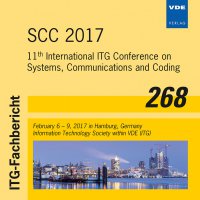Complexity of Analog Modulo Block Codes
Konferenz: SCC 2017 - 11th International ITG Conference on Systems, Communications and Coding
06.02.2017 - 09.02.2017 in Hamburg, Germany
Tagungsband: SCC 2017
Seiten: 6Sprache: EnglischTyp: PDF
Persönliche VDE-Mitglieder erhalten auf diesen Artikel 10% Rabatt
Autoren:
Schmitz, Tim; Schaefer, Felix; Jax, Peter; Vary, Peter (Institute of Communication Systems (IKS), RWTH Aachen University, Germany)
Inhalt:
Analog Modulo Block codes (AMB codes) provide a low-complexity channel coding strategy for discrete-time, continuous-amplitude signals like audio, video, or other sensor data. In contrast to digital coding, the transmission does not suffer from saturation of the quality of the decoded signal with increasing channel quality even if no feedback channel is available. In this paper, the complexity of AMB encoding and decoding is analyzed for the Discrete Maximum Likelihood decoder (DML), the Zero Forcing decoder with Lattice Reduction (ZFLR), and the Lattice Maximum Likelihood decoder (LML). A low-complexity algorithm for generating all valid lattice points, which are needed for the DML decoder, is introduced and analyzed. For the complexity reduction of the LML decoder by radius pre-check, further studies of the channel noise probabilities are conducted. Run time measurements qualitatively illustrate the validity of the results.


